Programas de transferencias monetarias sectoriales
Los PTM pueden ayudar a las personas en situaciones de crisis a abordar sus necesidades dentro de un determinado sector humanitario, tales como: agua, alimentos, salud, vivienda, medios de vida, o protección. Los PTM sectoriales pueden ser restringidos o sin restricción, condicionales o incondicionales, y normalmente serán proporcionados como parte de un paquete integral que puede incluir asistencia en especie o servicios.
Cada sector tiene que considerar distintas preguntas, retos, ventajas y riesgos cuando se trata de apoyar la recuperación de las personas dentro de su área de especialización. Esto requiere evidencias, herramientas, orientación y capacidad. Para cumplir los resultados sectoriales a través de los PTM también se requiere de una comprensión multisectorial de las necesidades y de la seguridad económica de los hogares (vea las Transferencias monetarias multipropósito). Mientras que algunos sectores tienen mucha experiencia en la implementación de los PTM y lo han hecho por muchos años, otros se están poniendo al día. La mayoría de los sectores humanitarios están comprometidos y han venido aumentando sus esfuerzos en los PTM sectoriales. El Grupo global de coordinación de clusters (GCCG, por sus siglas en inglés) también se encuentra coordinando el trabajo entre clusters para mejorar la utilización sectorial de los PTM.
Prioridades actuales
La CALP Network trabaja en estrecha colaboración con los grupos técnicos de asistencia en efectivo y equipos de tareas dentro de los clusters globales, que han estado definiendo sus prioridades y planes de trabajo del 2020 durante sus reuniones regulares. Una descripción general y detalles específicos de estas prioridades en cada cluster global está disponible aquí.
Subpáginas de los PTM sectoriales
-
Coordinación y gestión de campamentos y programas de transferencias monetarias
-
Educación y programas de transferencias monetarias
-
Seguridad alimentaria y programas de transferencias monetarias
-
Salud y programas de transferencias monetarias
-
Nutrición y programas de transferencias monetarias
-
Protección y programas de transferencias monetarias
-
Alojamiento y programas de transferencias monetarias
-
Agua, saneamiento e higiene (WASH) y programas de transferencias monetarias
Contenido destacado
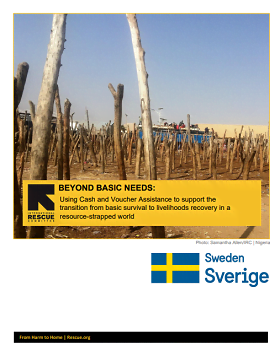
Beyond Basic Needs: Using Cash and Voucher Assistance to Support the Transition from Basic Survival to Livelihoods Recovery in a Resource-Strapped World
Guidelines and Tools
Do you think of yourself as a “cash” person OR as a “livelihoods” person? An “emergency” practitioner OR a “recovery” practitioner? Or do you find yourself unsatisfied with the often narrow implications of these terms? We’ll never have enough funding to provide basic needs support to everyone who needs it for the entire time they are in need, even if we take advantage of the...

Looking into 2020: short overview on global clusters, CVA and the CALP Network
Presentation
Overview as 2020 begins:
• Significant progress and commitment from all global clusters on integration of CVA into their work.
• Significant interest in different regions and by some donors on sector-specific CVA.
• Challenges that remain:
o Dialogue: 1) Ensuring CVA specialists understand sector specificities and successfully bank on the technical expertise emanating...

Building Evidence to inform the Effective Use of CASH and Voucher Assistance in Emergency Sanitation and Hygiene Programming
Report
An analysis of 5 case studies of utilization of CASH/Voucher Assistance are presented and analysed in the attempt of building evidence on their utilization in emergency WASH Sanitation and HP programming. Findings and recommendations are provided on Coordination, Situation and Response Analysis, Program Design, Implementation, Monitoring and Evaluation.
Últimos recursos
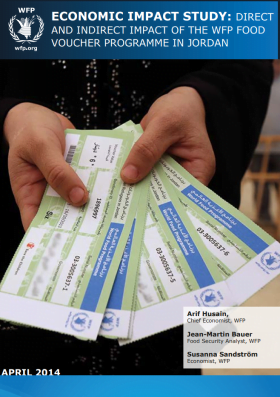
Economic Impact Study: Direct and indirect impact of the WFP food voucher programme in Jordan
Report
The intent of this study is to estimate the economic benefits of the food voucher programme implemented by the World Food Programmeme (WFP) for Syrian refugees in Jordan. The study employs a two pronged approach whereby the first component provides an analysis of the supermarkets that participate in...
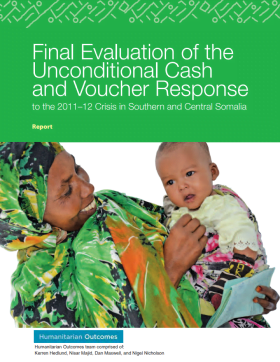
Final Evaluation of the Unconditional Cash and Voucher Response to the 2011–12 Crisis in Southern and Central Somalia
Report
This report sets out to determine the effectiveness of the unconditional cash and voucher interventions in southern and central Somalia. This evaluation however cannot be limited to the interventions at hand. It necessarily considers the broader context that led to the failure of the humanitarian...
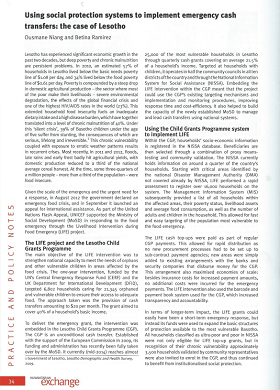
Using social protection systems to implement emergency cash transfers: the case of Lesotho
Report
Lesotho has experienced significant economic growth in the past two decades, but deep poverty and chronic malnutrition are persistent problems. Given the scale of the emergency and the urgent need for a response, in August 2012 the government declared an emergency food crisis, and in September it...
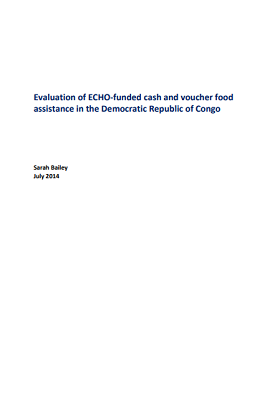
DRC Cash and Vouchers Food Security Evaluation (2014)
Report
People in eastern Democratic Republic of Congo (DRC) have long faced protracted conflict and instability resulting in the displacement of populations. In order to provide households affected by new displacements with timely access to food, ECHO funded the Norwegian Refugee Council (NRC), the Association...
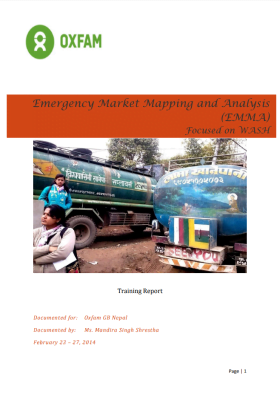
Training Report – Emergency Market Mapping and Analysis (EMMA): Focused on WASH
Report
Emergency Market Mapping Analysis (EMMA) is a toolkit guidance manual for humanitarian staff in sudden-onset emergencies which aims to improve emergency responses by encouraging and assisting relief agencies to better understand, support and make use of local market-systems in disaster zones. EMMA offers...
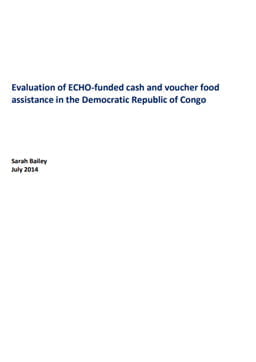
Evaluation of ECHO-Funded Cash and Voucher Food Assistance in the Democratic Republic of Congo
Report
People in eastern Democratic Republic of Congo (DRC) have long faced protracted conflict and instability resulting in the displacement of populations. In order to provide households affected by new displacements with timely access to food, ECHO funded the Norwegian Refugee Council (NRC), the Association...

Logistics and Administration Guideline for Cash Based Interventions – Annexes
Guidelines and Tools
These annexes are designed to be used alongside the Logistics and Administration Guideline for Cash Based Interventions, which aims to support logisticians and administrators to successfully support cash based interventions (CBIs) and to help technical departments too. The annexes include: a the CALP...
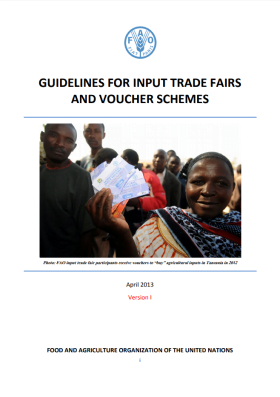
Guidelines for Input Trade Fairs and Voucher Schemes
Guidelines and Tools
One of the main causes of food insecurity for farmers in rural areas is limited access to agricultural inputs. The Food and Agriculture Organization of the United Nations (FAO) works to set up input trade fairs and voucher schemes to provide poor, vulnerable and food insecure farmers with access to the...
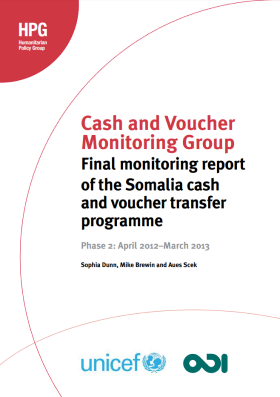
Final Monitoring Report of the Somalia Cash and Voucher Transfer Programme
Report
This report presents the findings of Phase 2 of a monitoring exercise of the Cash and Voucher Monitoring Group (CVMG), a unique partnership involving non-governmental organisations (NGOs) providing cash-based interventions in response to famine and humanitarian emergencies in South Central Somalia. It...
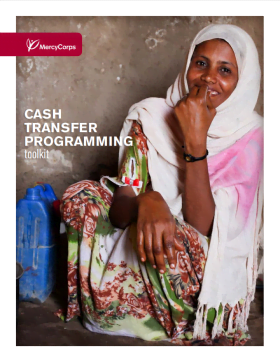
Cash Transfer Programming Toolkit
Guidelines and Tools
The Cash Transfer Programming (CTP) Toolkit is a basic guide to cash transfer programming in emergency response and early recovery settings. The publication is based upon best practiced and practical experience from Mercy Corps programmes. The Toolkit provides general guidance for CTP, as well as...
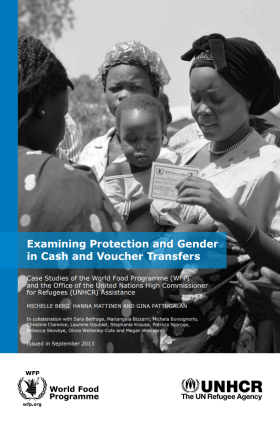
Examining Protection and Gender in Cash and Voucher Transfers – Report
Report
With cash and voucher transfers increasing as a form of humanitarian assistance, the World Food Programme (WFP) and the UN Refugee Agency (UNHCR) teamed up to study the potential protection and gender impact of such transfers. While much research had been done about economic and market impacts of cash and...
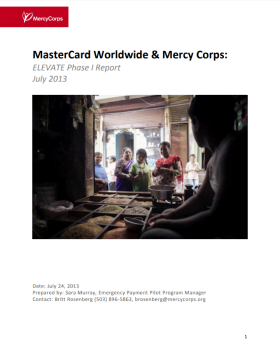
MasterCard Worldwide and Mercy Corps: ELEVATE phase I report
Report
The Nepal pilot focused on testing several key stages in the deployment of mobile vouchers, including the following: Identify a technology partner, Customize a mobile voucher platform, and Use the platform to distribute goods to people in need. Two different types of mobile vouchers (SMS and smartphone...
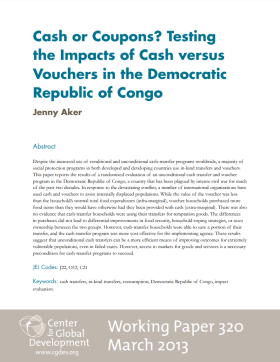
Cash or Coupons? Testing the impacts of cash transfers versus vouchers in the Democratic Republic of Congo
Report
Despite the increased use of conditional and unconditional cash-transfer programs worldwide, a majority of social protection programs in both developed and developing countries use in-kind transfers and vouchers. This paper reports the results of a randomized evaluation of an unconditional cash transfer...
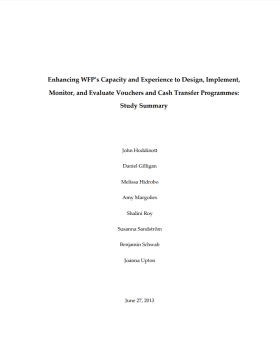
Enhancing WFP’s Capacity and Experience to Design, Implement, Monitor, and Evaluate Vouchers and Cash Transfer Programmes: Study summary
Report
With support from the Government of Spain, and in partnership with the World Food Programme (WFP), researchers from the International Food Policy Research Institute (IFPRI) evaluated four pilot projects to assess the comparative performance of cash transfers, food payments, and vouchers on household food...
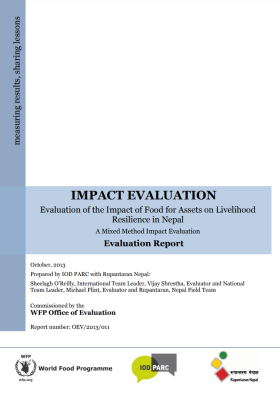
Impact Evaluation: Evaluation of the impact of food for assets on livelihood resilience in Nepal
Report
This evaluation, conducted by an independent team between January and July 2013, assessed the outcomes and impacts of the food-for-assets (FFA) components of two WFP programmes in Nepal: country programme (CP) 100930 (2002–2007) and protracted relief and recovery operation (PRRO) 106760 (2007–2010)....
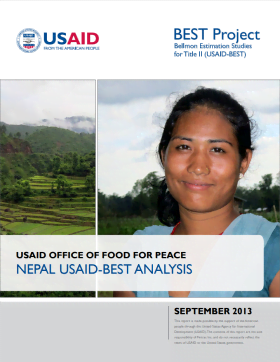
Nepal USAID-BEST Analysis
Report
During the months of July-August 2013, the Bellmon Estimation Studies for Title II (USAID-BEST) team undertook a study of the current state of agricultural markets in Nepal to inform USAID food assistance programming decisions. This USAID-BEST Analysis provides an overview of local markets,...
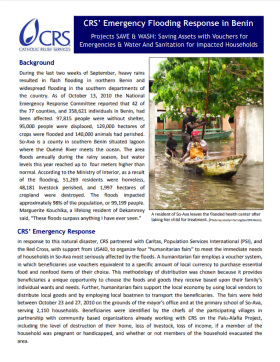
CRS’ Emergency Flooding Response in Benin
Report
In response to flash flooding in northern Benin and widespread flooding in the southern departments of the country, Catholic Relief Services (CRS) organised 4 “humanitarian fairs” to meet the immediate needs of households most seriously affected. These fairs were unique in that they incorporated three...

Water Trucking Market System in Harshin
Report
The Somali region of Ethiopia is an arid area which suffers from a water shortage every year. However, the degree of severity can differ quite markedly from year to year and the existence of microclimates within the region itself means that needs are never uniform. In 2011, the region experienced two...
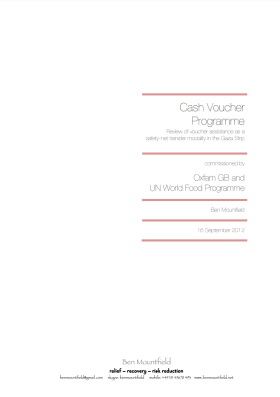
Cash Voucher Programme: Review of voucher assistance as a safety-net transfer modality in the Gaza Strip
Report
This review commissioned by Oxfam GB and WFP, looks at the effect of the Cash Voucher Project of WFP / Oxfam / Ma’an (CVP) on beneficiaries in Gaza. The review studies the impact on beneficiary diets and interviews beneficiaries to obtain their opinion on cash vouchers over in-kind food aid. The review...
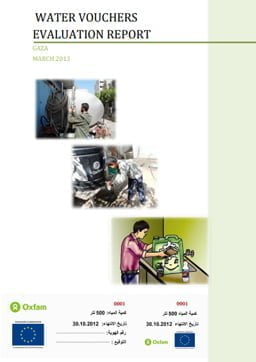
Water Vouchers Evaluation Report, Gaza 2013
Report
A participatory assessment on disaster risk reduction (DRR) was undertaken in GAZA governorate in 2011, OXFAM being the lead agency within the WASH cluster emergency response and preparedness in this area. Three vulnerable neighbourhoods (AL MALALHA, AL MOGRAGHA and AL ZARGA), were identified and an...


